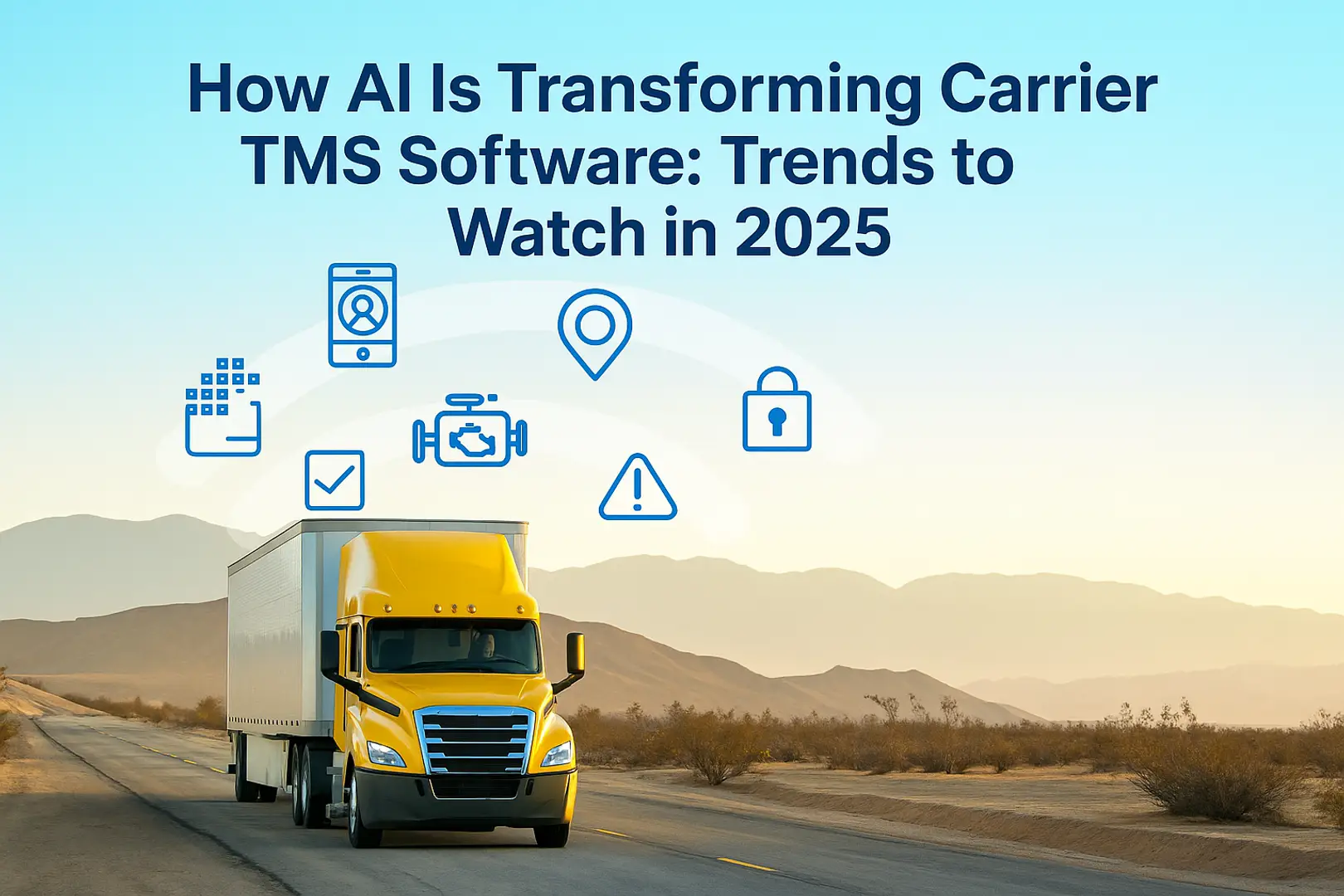

How AI Is Transforming Carrier TMS Software: Trends to Watch in 2025
Introduction
As the logistics world advances through 2025, Carrier TMS Software is being transformed from basic management tools into sophisticated, AI-driven command centers. This evolution reflects the industry’s need to stay agile amid fluctuating fuel prices, evolving regulations, and rising service expectations. At the forefront of this change is Artificial Intelligence (AI), which is enhancing decision-making, operational clarity, and fleet adaptability.
This article highlights how AI is shaping the future of Carrier TMS Software and explores essential trends for forward-looking logistics teams.
Learn more in our detailed guide on TMS for Carriers.
Predictive Capabilities Replace Reactive Planning
Legacy TMS systems were built to respond after issues occurred. Now, AI enables predictive tools that anticipate challenges before they arise. These intelligent platforms can process large volumes of data—from traffic to weather—to enhance logistics foresight:
- Anticipate delays using historical and live data
- Provide dynamic ETAs for improved accuracy
- Automatically suggest alternative routing to reduce disruptions
With predictive analytics, Carrier TMS Software supports smoother, more consistent delivery performance.
Real-Time Route Optimization with AI Learning
AI’s adaptability brings route optimization to a new level. Unlike static routing, intelligent algorithms continuously refine paths based on live conditions:
- Monitor traffic patterns and adjust in real time
- Account for vehicle load and environmental variables
- Ensure HOS compliance through automated scheduling
AI also improves Fuel Management by reducing unnecessary mileage, while supporting eco-friendly route alternatives.
Smarter Load and Capacity Coordination
Manual methods can’t match the speed or accuracy of AI-based load planning. Carrier TMS Software now leverages smart algorithms to:
- Anticipate demand spikes and allocate resources accordingly
- Optimize vehicle assignments to reduce idle miles
- Sync with Truck Load Management Software to streamline multi-load routes
The result is a leaner, more responsive logistics operation.
Agile Rate Adjustments and Contract Oversight
In today’s fluctuating market, fixed pricing strategies often fall short. AI now enhances Transport Management System platforms with:
- Instant notifications on rate shifts and cost patterns
- Data-backed contract renegotiation tools
- Bid automation through Analytics Software insights
This enables logistics companies to remain competitive without constant manual oversight.
Predictive Visibility for Smarter Deliveries
Customer satisfaction depends on more than just timely deliveries—it’s about knowing where freight is and when it will arrive. AI improves tracking by:
- Forecasting arrival windows based on real-time variables
- Alerting for unexpected route changes
- Using chatbots to keep customers informed automatically
Systems like Truck Tracking Software make this visibility more intelligent and accessible.
Proactive AI-Powered Cybersecurity
As digital threats grow, so does the importance of TMS system security. AI assists by:
- Spotting suspicious activity with behavioral algorithms
- Blocking phishing or malware attempts instantly
- Running 24/7 threat detection and mitigation
This layer of intelligent defense protects both business continuity and client trust.
Sustainability Through Intelligent Reporting
Green logistics is no longer optional. AI within TMS systems aids sustainability efforts by:
- Tracking carbon output across routes
- Suggesting cleaner transport methods
- Automating compliance with ESG standards
Such systems also support Easy Onboarding of eco-conscious carriers and partners.
Streamlining Operations from End to End
From dispatch to payroll, AI is making Carrier TMS Software more integrated and efficient. Enhancements include:
- Automated invoice verification and billing audits
- Smart driver scheduling aligned with route efficiency
- Customer service optimization based on interaction analysis
Integrated modules like Dispatching Software, Driver Mobile App, and Driver Payroll Software enable seamless management of personnel and processes.
Final Thoughts: Preparing for the Intelligent Logistics Era
Artificial Intelligence is no longer an experimental add-on—it’s the new standard for competitive transportation management. In 2025, the most successful logistics teams will be those using AI-enhanced Carrier TMS Software to increase transparency, reduce inefficiencies, and improve delivery experiences.
To stay competitive, logistics providers must embrace AI as a foundational capability—not a future upgrade.
Related Posts
© 2025 Invastor. All Rights Reserved

User Comments